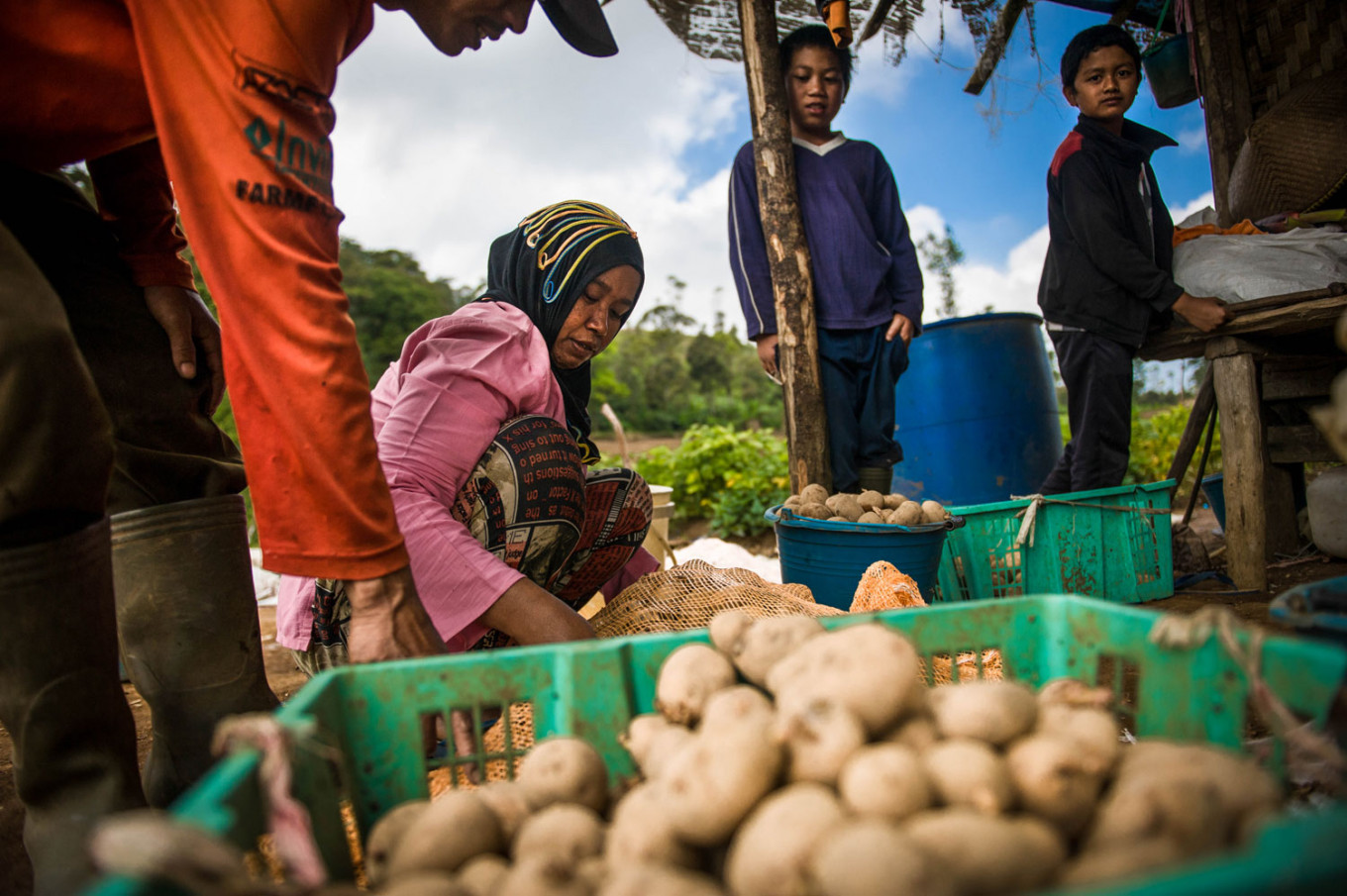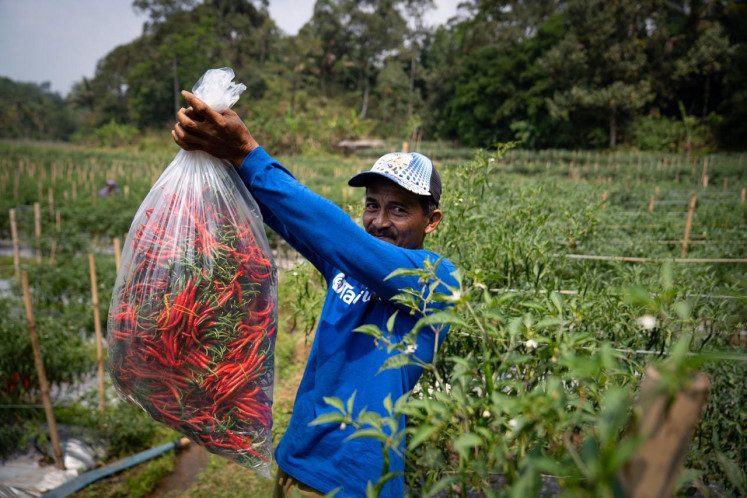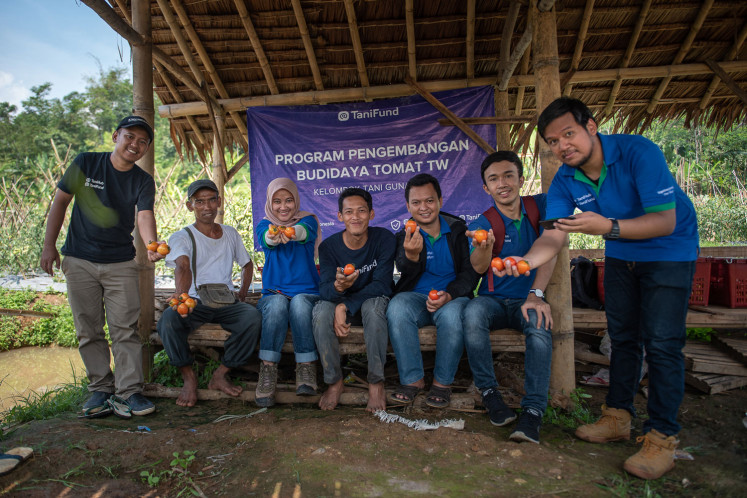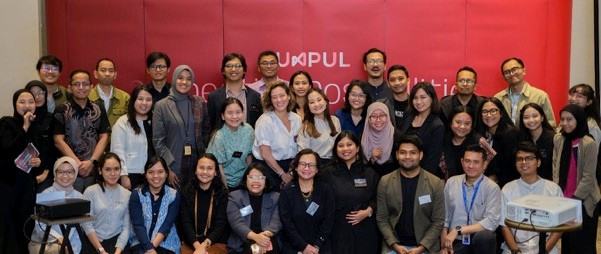TaniFund P2P lending platform supports farmers’ productivity
The agricultural sector is the second-largest contributor to the Indonesian economy, with a recorded 2.19 percent year-on-year growth in the second quarter of 2020.
Change text size
Gift Premium Articles
to Anyone
 Freshly harvested granola potatoes in Ciwidey, West Java, are seen in this picture with farmer partners of TaniFund on the background. (Courtesy of TaniHub)
Freshly harvested granola potatoes in Ciwidey, West Java, are seen in this picture with farmer partners of TaniFund on the background. (Courtesy of TaniHub)
T
he agricultural sector is the second-largest contributor to the Indonesian economy, with a recorded 2.19 percent year-on-year growth in the second quarter of 2020, according to a report by The Jakarta Post.
It has also helped buffer the national economy while most other sectors, such as transportation and warehousing, suffered steep declines as a result of pandemic-related restrictions.
Agricultural businesses, however, are still hampered by farmers’ lack of access to funding. Many farmers do not even have a bank account, forcing them to borrow money from their neighbors or tengkulak(village-level commodity middlemen). Not only does this compromise the farmers’ productivity,it has also compromised their welfare.
This is where homegrown agricultural technology (agritech) start-up TaniHub Group’s peer-to-peer (P2P) lending platform TaniFund comes to the aid of farmers. TaniFund is part of the TaniHub Group, which encourages the public to invest in an ecosystem seeking to boost farmers’ access to funding and welfare. TaniFund and TaniHub seek to boost farmers’ access to bigger funding and markets.The two endeavors are aimed at boosting their productivity and ultimately, the welfare of farmers.
“Investing in the local agricultural sector will give you benefits equal to investing in many other financial instruments, including time deposits and government bonds. Investing in the sector also entails lower risks than investing in the stock market, offering investors an average annual return of 12 to 14.1 percent,” TaniFund director Edison Tobing said during an exclusive interview on Wednesday.
Members of the public can look at various agricultural projects open for their investment, including a detailed portfolio outlining the feasibility of each project along with investment terms and conditions at tanifund.com.
To manage investment risks, TaniFund, which is registered with and supervised by the Financial Services Authority (OJK), always conducts feasibility studies on the agricultural projects that it seeks to support, before eventually starting a fundraising program.
TaniFund is part of TaniHub Group’s comprehensive ecosystem seeking to help farmers run their businesses more effectively. The support also goes beyond tapping into grassroots investments.
TaniFund also closely monitors and supervises farmers as they start working to help them improve their produce quality. Once the farmers harvest their produce, the farmers will give 100 percent of their produce to TaniHub through the TaniSupply distribution chain.

Afterward, TaniHub, through its smartphone applicationand web-based store, sells the produce to clients that include exporters, local traditional markets, hotels, restaurants and catering companies, modern retailers as well as industries.
The TaniHub Group also helps link these farmers with suppliers of high-quality raw materials such as fertilizerwhile also helping farmers boost their financial literacy and business strategies.
Edison said the TaniHub Group also collaborated closely with agronomists from the Bogor Agricultural University (IPB) in West Java as well as other universities.
“Together, we introduce new farming practices to these farmers. We do this in a participative way by conducting new practices alongside the time-tested ones they have already been using for a long time. If the new practice we introduce turns out to be successful, they will be convinced to adopt it,” Edison said.
The start-up’s support does not concern only the commercial aspects of agriculture but also strives to create a social impact.
“Previously, farmers made money only when they were successful in selling their produce. They often lived with little to no money at all, which forced them to borrow money from their neighbors. Using the funds people have invested, we help these farmers have a regular income for their work,” he explained.

He added that under the TaniFund system, the farmers did not pay their loans by cash.Instead, they settle their loans by supplying TaniHub with their produce. When the targeted tonnage and price of the produceare met at the time of harvest, TaniFund considers their loans settled.
TaniHub also divides the profits of the produce sales with farmers, which will help them further expand their farming activities and employ more local workers.
“Under this system, the farmers can also have a positive impact on the economy of their communities,” Edisonsaid.
As of June, TaniFund has disbursed Rp 132.66 billion (US$8.9 million) in loans to fund the projects of about 1,800 farmers included in its ecosystem. Of the amount, lenders can receive an average 14.18 percent return per annum.
“Currently, most of the farmers still live in Java. We also conducted projects in Ambon, Maluku and West Nusa Tenggara but did not continue them. We are committed to expanding our reach beyond Java by working on Sulawesi island this year,” he said.
For 2020, TaniFund has set its sights on disbursing a total of Rp 120 billion to local farmers, driven by more diversified demand, including in terms of rice cultivation and even animal husbandry, specifically breeding goats. The TaniHub Group as a whole, meanwhile, has set an ambitious target of including 1 million Indonesian farmers in its ecosystem by 2021.
“With the help of the government and other relevant institutions, as well as agronomists and scholars from related fields, we are confident that we can include more farmers in [the TaniHub Group] ecosystem,” Edison said.
The TaniHub Group will also mark its fourth operational anniversary in conjunction with National Agricultural Day, which falls on Sept. 24, with a month-long series of events – mostly virtual – and sales promotions, covering three pillars: community, consumer and corporate.
Under the community pillar, TaniFund seeks to engage local farmers to boost their financial literacy, as well as invite more members of the public to start investing in the local agricultural sector, especially to bolster economic resilience.
Under the consumer pillar, TaniHub seeks to encourage more Indonesians to buy their domestic produce from local farmers. Under the corporate pillar, meanwhile, the TaniHub Group will conduct various writing, photography and videography activities to promote urban farming and honor the hard work of Indonesian agricultural heroes.
Together, we can boost Indonesia’s agricultural sector productivity, thus maintaining economic resilience amid the tough times of the COVID-19 pandemic.









